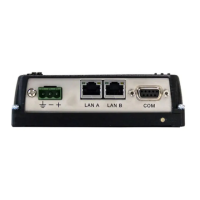Performance
Due to the nature of Modbus RTU it is to be considered a fairly slow non deterministic
communication protocol. The performance is directly affected on the amount of slaves, reponse
time of the slaves, communication timeouts etc. Modbus RTU is a polling protocol and the
polling is carried out in a sequence starting with the slave with the lowest ID.
Depending of the setup the reponse time will differ a lot however a general hint of what to
expect would be second based updates. Of course a faster update is achievable but it will depend
of the setup.
Dynamic configuration and application triggers
When inserting a Modbus slave in the project tree the configuration is static. If dynamic
configuration is required this must be handled in IEC code. Use the following link for details of
how to create a dynamic configuration.
https://faq.codesys.com/display/CDSFAQ/Modbus+RTU%3A+Dynamic+Configuration
To use an event based approach to enable communication of certain request (channels) the
application trigger approach is one way to achieve this. Use the following link for details of how
to trigger requests from IEC code.
https://faq.codesys.com/pages/viewpage.action?pageId=24510480
Links
For more details of how to configure Modbus RTU with the X2 series use the following links.
X2 Series and BFI
https://www.beijerelectronics.se/sv-SE/Support/Help___online?docId=68119
X2 series and G-series I/O
https://www.beijerelectronics.se/sv-SE/Support/Help___online?docId=68108

